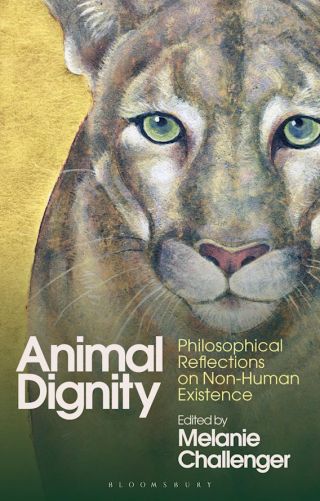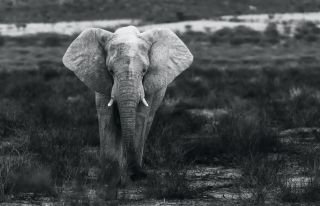Animal Behavior
Do Animals Have Dignity?
A new book makes the case for applying the concept of dignity to non-humans.
Posted October 23, 2023 Reviewed by Tyler Woods
"My hope is that a more formal recognition of animal dignity would prohibit debasing objectification and reset our relations with other species." -Melanie Challenger
People often say something like, "We need to treat animals with dignity..." but don't tell us exactly what that means. I, too, am often confused because I know what I mean but can't precisely articulate it. When pressed, I often say that having dignity means that animals—human and nonhuman alike—are worthy of respect because of who they are, for their inherent value.1
Because I'm deeply interested in the general topic of animal dignity, I was thrilled to see a single book edited by Melanie Challenger (with a foreword by Jane Goodall) titled Animal Dignity: Philosophical Reflections on Non-Human Existence that is devoted to this topic. In this landmark, deeply thoughtful book, experts from different disciplines and cultures weigh in on this important topic. Here's what Melanie had to say about these wide-ranging accounts of animal dignity.

Marc Bekoff: Why did you compile the essays for Animal Dignity?
Melanie Challenger: I have thought about exploring the idea of animal dignity since around 2016 or 2017. This came out of a critical examination of the concept of human dignity, which I undertook for my book How to Be Animal. I could see that dignity captures something very real about how we relate to one another.
But dignity, more than personhood, can’t and shouldn't be based on exceptional human attributes. As such, it struck me that dignity is a more suitable concept to relate to other animals, both in capturing the importance of fundamental respect and in recognizing how power dynamics can leave individuals vulnerable to denigration. Not only can dignity help establish a positive way of attending to another, but the concept can also be embedded in ethics and law to prevent certain kinds of harmful acts. Originally, I thought I would author a book on this by myself, but I quickly realised that it would be much more significant to gather together scholarship across different regions, cultures, and domains of study. I think and hope that the result is more than the sum of its parts.
MB: How does your book relate to your background and general areas of interest?
MC: My primary work is as a writer, both of non-fiction and in the creative arts. My non-fiction focuses on the history of ideas on the living world, and the history and philosophy of science. My particular fascination is with what life is and how it matters. That research led me to bioethics, and I am currently the deputy co-chair of the U.K.'s national bioethics body, the Nuffield Council.
MB: Who is your intended audience?
MC: This is a hybrid book, which is always a bit of a gamble. On the one hand, there are poems and personal essays that are accessible to anybody, and on the other hand, there are more formal pieces of scholarship. We wanted to make the work as approachable to the public as possible while also having sufficient depth for scholarly engagement. We also wanted to be true to the nature of dignity, which crops up in many of the world's constitutions, in our legal systems, but also in our everyday lives. And so we hoped to capture that in the design and style of the book.
MB: What are some of the topics you weave into your book, and what are some of your major messages?
MC: The book has four main sections. First, we define the concept of animal dignity. One common claim is that dignity is unique to humans. Much of the first part of the book counters this idea. The second section considers what lies at the heart of animal dignity. There’s consensus here that dignity is always about a certain special kind of moral attention and respect status. Dignity is also commonly used to explain denigration as the withdrawal of this respect. We see this when people are treated as things, as worthless. When we acknowledge that crucial connection with disrespect, humiliation, and denigration, we can begin to see how that relates to the language, imagery, and legislation that objectifies animals as resources or pests. In the third section, we look at dignity in different cultures, from the African idea of "ubuntu" to the Indian root for dignity in "prana."

The final part of the book discusses the positive work that dignity can do for other species. How might animal dignity appear in law or in our constitutions? How might it alter the research we undertake as scientists? Something exciting and unexpected that has emerged from this book is the drafting of a major Declaration on Animal Dignity, which is currently gathering endorsements and will launch in 2024.
MB: How does your book differ from others that are concerned with some of the same general topics?
MC: This is the first book to focus entirely on animal dignity as a concept. I think the strength and uniqueness of our volume lies in its multicultural and multifaceted qualities: thinkers from Ojibwe philosophy sit alongside Western perspectives, theologians alongside scientists, legal scholars alongside animal welfarists.
MB: Are you hopeful that as people learn more about who other animals truly are, they will treat them with more respect?
MC: That use of "who" in this question is key. Anyone who lives or works closely with other animals knows that, from hummingbirds to house mice, the other beings around us are resourceful, unpredictable, varied, and aware. They have different kinds of intelligences and capacities, but they each have an interest in their lives and the agency to pursue those interests. They are subjects, in other words.
And yet, even though we have environmental and animal protections, there isn't a single non-human being in the major societies of our planet that is given true moral status for who they are. As such, for all intents and purposes, everyone out there that isn't human is a thing or an object in the eyes of the law. People like Steven Wise of the Nonhuman Rights Project have fought hard to chip away at this. But my hope is that we can reach into the laws of most major democracies through dignity. Dignity is about fundamental respect for different kinds of beings. A more formal recognition of animal dignity would prohibit debasing objectification and reset our relations with other species.
References
In conversation with "natural philosopher" Melanie Challenger—also a writer, researcher and broadcaster on environmental philosophy and history, and Deputy Chair of the Nuffield Council on Bioethics.
1) For a discussion of the difference between dignity and respect see "What’s The Difference Between Dignity and Respect? I find this distinction to be very helpful: "Respect can be defined as 'showing regard or consideration for' and dignity can be defined as 'worthiness.'”




